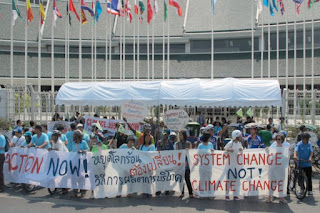 |
| Protesters in Bangkok outside the UN climate talks. |
The U.N. climate talks featuring delegates from 190 nations, that have been ongoing for the last week in Bangkok, Thailand, and which conclude today, have produced few concrete results.
The talks were happening against a backdrop of record Arctic ice melt, recent flooding in the Philippines, Asam and other areas, recent drought in the US, and an ongoing food crisis in the Sahel.
Last December at the Durban COP talks, the world's nations agreed that they would sign a legally-binding pact to cut emissions and help developing nations adapt to climate change, from 2020. Part of this agreement included a promise to deepen existing promises to cut emissions by the end of the decade.
However, after one week of talks in Thailand, not a single country has made a fresh commitment, and US negotiators stunned delegates by calling for any new treaty to be ‘flexible’ and ‘dynamic’ rather than legally binding, representing a complete U-turn on its previous position.
In response, 130 developing countries sought to put pressure on developed countries by threatening to deny them access to Clean Development Mechanism (CDM) credits, which developed countries use to offset their emissions by financing projects in the poor ones.
But this tactic could backfire, as Takehiro Kano, a senior climate negotiator with Japan, said that if they went ahead, Japan's response might just be to lower its voluntary target of cutting emissions 25% below 1990 levels by 2020, and Justin Lee, Australia's climate change ambassador, retorted that the Australian government would anyway "take international action that best supports Australia's domestic initiatives".
The United States and other developed countries blamed the global economic crisis for the lack of funds that they are able to make available to combat climate change. In a reaction to this, developing countries earlier tried to play down requests for finance and technology commitments, in favour of greater efforts by developed countries to reduce their greenhouse gas emissions.
But this created yet another deadlock, as Japan, Canada and Russia, which refused to sign up to an extension to the Kyoto Protocol as last December's climate summit, dug their heels in and refused to rejoin the process. The European Union argues that it cannot afford to up its reduction targets, and the United States is in an election year, which paralyses its ability to act.
This has led one observer, Sanjay Vashist, director of Climate Action Network South Asia, to comment that, "the existing deadlock on taking up ambitious climate action will only delay the necessary adaptation finance to vulnerable countries."
Christiana Figueres, executive secretary of the UN’s climate secretariat, Was putting a brave face on it. “Government negotiators have pushed forward key issues further than many had expected and raised the prospects for a next successful step in Doha," she said.
This leaves many political decisions that will have to be taken at this next meeting in Qatar.
With the present level of commitments to reduce emissions, the world is still on for at least a 3°C temperature rise, which would have catastrophic repercussions.
Rich nations failing to cut emissions
At the summit, the U.N. released a report showing that several rich nations will not even meet their existing pledges to cut greenhouse gas emissions by the end of the decade, made at Copenhagen in 2009.
These nations include Australia, Canada, Japan, Mexico, South Africa, South Korea and the US.
The report, from the UN Environment Program, adds that even if all nations do meet their existing pledges, emissions of greenhouse gases will still reach between 50 and 55 billion tonnes of carbon dioxide equivalent, that is 11 billion tonnes, or 20%, more than what is needed to try to keep temperature increases below 2°C.
“It's still possible to meet a 2°C pathway, if there is sufficient political will," commented Niklas Hoehne, and author of the report on Tuesday. "We’re not facing a participation gap here – it’s an ambition gap.”
Meanwhile, developed countries want the industrialised developing countries such as India, China and Brazil, to take more responsibility for cutting their emissions.
They say that if this was resolved, it would allow the issues of technology, finance, intellectual property lies and emissions from aviation and shipping, which are stymied, to be set aside while the responsibilities of the emerging economies are increased in the short and long-term and the rich countries take stronger action after 2020.
But this is unlikely to happen without further commitments from developed countries. Depressingly, it seems the stalemate continues.
No comments:
Post a Comment